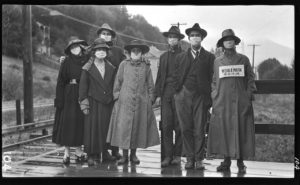April 2020 Issue of The Throwback
The April issue of The Throwback, my monthly history-themed e-newsletter, includes a recommendation of a new Netflix series on Malcolm X, a book on John Adams and the Boston Massacre Trials co-authored by an ABC legal analyst, along with a podcast recommendation and a plea for indie bookstores in these difficult times. Click here to read. 
And just a note about the coronavirus/COVID-19 pandemic:
We are living through historic times. That’s for sure.
I think it’s important to remember, though, that although the times may be historic, they aren’t altogether unprecedented.
We tend to think of globalization as a recent trend, but centuries ago diseases and viruses also spread around the world. The bubonic plague that killed 60% of Europeans in the 1300s originated in China and swept westward along trading routes to the Middle East. The arrival of Europeans to the North American continent brought contagions that decimated Native American populations.
I think the closest parallel to the current coronavirus pandemic, however, is the influenza pandemic that swept the globe in 1918. It killed as many as 50 million people around the world and approximately 650,000 in the United States. As I wrote in this piece for History.com, nearly 200,000 Americans died in October 1918 alone. It was America’s deadliest month ever.
Life in many towns and cities came to a standstill in October 1918 as municipalities shuttered public gathering places such as schools, churches, theaters and saloons. In Philadelphia, however, Public Health Director Wilmer Krusen ignored pleas from doctors and refused to cancel a parade to promote the sale of government war bonds that was attended by 200,000 people. It was a deadly decision. Over 11,000 Philadelphia residents, many of them infected at the parade, died in October 1918, including 759 on the worst day of the outbreak.
It’s so critical for us to learn our history not just so we avoid the mistakes of the past, but to give us some comfort in difficult situations just like the one in which we now find ourselves.
The stay-at-home orders now in place in much of the United States are an attempt to avoid a repeat of Philadelphia’s experience in October 1918.
I think we can take comfort in that.
Although a pandemic shut down daily life in October 1918, the economy bounced back to produce the Roaring Twenties.
I think we can take comfort in that.
When America has confronted hardships before, it has risen to the occasion.
I think we can take comfort in that.
May the past be our guide to a brighter future.